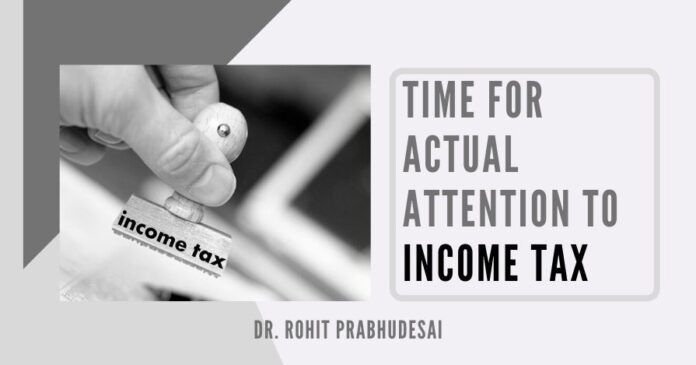
India to achieve get on the rapid growth trajectory, especially in the wake of a Coronavirus crisis
Back in February when P Chidambaram gave an interview to Economic Times, his views, surprisingly, echoed those of an old nemesis – Dr. Subramanian Swamy[1]. Though the specific measures differed, both essentially pinpointed the need for demand to pick up for economic growth to go up[2].
Dr. Swamy, on his part, has been relentlessly pursuing the issue and in his recently released book “Reset: Regaining India’s Economic Legacy,” which has garnered overwhelmingly favorable reviews, he expounds his views in great detail[3]. The central point he makes is the need to put more money in the hands of the masses, specifically, the influential middle-class that significantly determines consumption patterns and currently forms around 25% of the population (expected to be 41% by 2025)[4]. This is to be achieved, he believes, by entirely abolishing personal Income Tax (IT)[5]. The logic, from an economic perspective, is simple: higher disposable income leading to higher consumption, which in turn leads to growth at a macroeconomic level through the multiplier effect. The revenue lost, he argues, will be mainly offset through the indirect taxes gained through the additional consumption that will be made and auctioning of natural resources.
However, both ultimately turn out to be not relief measures but pure balancing acts akin to the earlier Income Tax reform exercise- the former is a straightforward case of asking to pay later and other merely an attempt at marginally increasing consumable income by decreasing savings for the next three months.
Recently, there was another article published in PGurus on the topic demonstrating with data how this wasn’t as outlandish an idea as it seems at the outset[6]. While the general notion is that of personal income tax is a crucial pillar of revenue for the government, actually it contributes to roughly about 2% to the income. What is even more disproportionate is that barely about 1% of the population bears the burden for it[7]. The catch is that this 1% does major consumption in the economy, which will ensure that additional income resulting from income tax savings will result in a quick and wide-spread domino effect.
However, the government, on its part, seems to have diagnosed the economic problem as a supply-side issue. Recently, it slashed the corporation tax to 22% from the earlier rate of 30%. A loss of around 1.45 lakh crore was expected[8]. On the demand side, personal income tax slabs were tweaked but eventually, the effect turned out to be the same or even worse than that under the previous structure[9]. Now, again, a slew of measures have been announced to help firms balance their books and manage liquidity, a supply-side exercise essentially. Two so-called major relief measures have been announced to stimulate demand as well- an extension of the deadline to pay personal income tax and reduction of provident fund rate[10]. However, both ultimately turn out to be not relief measures but pure balancing acts akin to the earlier Income Tax reform exercise– the former is a straightforward case of asking to pay later and other merely an attempt at marginally increasing consumable income by decreasing savings for the next three months.
In a real sense, the word Atmanirbhar is to make one self-sustainable. Ensuring that the middle-class has more of their disposable income left with themselves would enable them to be the influencers of the growth story the country is aiming to write. Seen from the angle of economics, too, this makes sense for firms can manage themselves sufficiently well in the long-run only when consumers are willing to purchase more; for they are the means that ensure organic growth, rather than the artificial stimulants, which help, if at all, only in the short-run.
Thus, for India to achieve get on the rapid growth trajectory, especially in the wake of a Coronavirus crisis, there is a need to at least suspend personal income tax collection for the year(s), if not bring major (and real) changes to its structure. If this does not form a part of the government’s 20 lakh crores stimulus package, it would be difficult for the demand to pick up again, no matter what the supply side efforts turn out to be.
Note:
1. The views expressed here are those of the author and do not necessarily represent or reflect the views of PGurus.
References:
[1] Want to revive demand? Put money in hands of masses, not classes: Chidambaram – Feb 06, 2020, Economic Times
[2] Abolish income tax, hike FD interest, cut it on loans: Subramanian Swamy – Aug 24, 2019, Economic Times
[3] RESET: Regaining India’s Economic Legacy – Rupa Publications
[4] The rise of the new middle class: No political party can afford to take them for granted – May 1, 2019, Financial Express
[5] Abolish income tax, hike FD interest, cut it on loans: Subramanian Swamy – Aug 24, 2019, Economic Times
[6] Abolishing Personal Income tax in India – A study along with History and Data – Apr 27, 2020, PGurus.com
[7] Only 2% of India GDP Comes from Personal Income Tax, Says Revenue Secretary – Feb 4, 2017, News 18
[8] Nirmala Sitharaman slashes corporate tax to fire up economy, market responds with a massive surge – Jan 16, 2020, Economic Times
[9] Old vs. New Tax Regime? Here’s all you need to know – Feb 03, 2020, Business Line
[10] Finance Minister Nirmala Sitharaman reveals the details of Modi’s ₹20 lakh crore stimulus package – May 13, 2020, Business Insider











Unless Disposable income is increased certainly demand won’t increase …Govt should take immediate steps .Post Covid salaried class will be very hesitant to buy non essential commodities. Scrapping personal income tax will certainly prove booster.
If abolishing personal income tax is such a great idea, why is it that no country in the world has done it?
Why should we not pave the way? Furthermore, why should we care? If it suits our economy, we should go ahead with it without thinking of, ‘[gorey] log kya kahengey?’–not just abolishment of personal income tax, but all of it in toto–? It will analogously solve a lot of problems, apart from the demand side crisis which requires urgent attention from a recovery perspective. 🙂